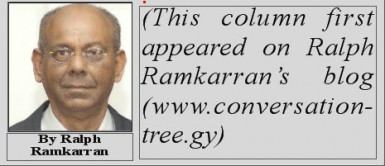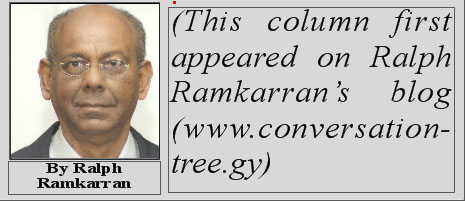Formal exchanges of letters between the Minister of Finance, Dr Ashni Singh, and the Shadow Minister of Finance, Mr Carl Greenidge, seeking to fix a date for a meeting to discuss the proposed Budget, and the inevitable name calling when the exercise proved unsuccessful, ought to have alerted everyone that no serious discourse will take place. The identical process and outcome played out last year. The identical process and outcome will likely play out next year. A different outcome will be achieved only when a larger political understanding leads to telephone calls between these distinguished gentlemen, or their secretaries, to schedule meetings, as is normal office practice.
That process having expectedly failed, the inevitable last ditch effort is being made on Monday morning, just as last year. The opposition has a long list of demands with a threat of $40 billion in cuts if those demands are not met. We must all wish the government and opposition well and hope that the talks succeed.
The Budget should really be judged on the performance of the economy and how the proposals are expected to enhance that performance, if it has been positive. By any standards the economy has been showing significant progress in recent years. The basis on which this is occurring, namely, the growth of the mining industry and less modest growth in other areas such as rice and construction, is still tenuous and not sufficiently broad and deep to be really sustainable, especially if the gold price tumbles. Signs of a weakening are already emerging. But taken together with visible developments all across the country, translating into human development if not economic growth, there is certainly a good possibility that Guyana is on the road to economic growth which can become sustainable.
 Some gestures have been made to the disadvantaged by the increase in pensions and reduction in income tax rates, modest though they are. Property owners benefit by property tax and mortgage interest concessions. No rational person can expect that the larger demands of the opposition for an increase in salaries and a reduction in VAT can happen at the same time. There is also something of a long-term strategy, held together mainly by the Amaila Falls Project, supplemented by the airport, even the Marriott, as well as substantial expenditure on infrastructure and social development.
Some gestures have been made to the disadvantaged by the increase in pensions and reduction in income tax rates, modest though they are. Property owners benefit by property tax and mortgage interest concessions. No rational person can expect that the larger demands of the opposition for an increase in salaries and a reduction in VAT can happen at the same time. There is also something of a long-term strategy, held together mainly by the Amaila Falls Project, supplemented by the airport, even the Marriott, as well as substantial expenditure on infrastructure and social development.
The opposition has not advanced an alternative overall vision or strategy or pointed out any areas of omission. The criticisms have all been mainly subjective – rejection of the Marriott, suspicion about Amaila and the airport, corruption, too little for pensioners, failure to reduce VAT, the importance of a new Demerara River bridge and so on.
The main focus throughout the week has been on what cuts the opposition will make. This is not an economic strategy. Guyana is not in a debt crisis compounded by recession, as many European countries, which are resorting to austerity. A substantial portion of the cuts are proposed because the opposition is dissatisfied with the functioning of the institutions concerned such as NCN, GINA, GPL and GuySuCo. This being the case, the solution is not to cut the Budget and harm employees. It is to negotiate to restructure these bodies in return for support of the estimates. The issue therefore is not the Budget. It is the inability of the government and opposition to talk. Even at this late hour it is hoped that these issues can be resolved.
Suspicions arise with regard to a range of projects including Amaila Falls, the airport, even the Marriott, GPL, GuySuCo and infrastructure works. These projects cannot be starved of funds because both the country and workers will suffer grievously. The Minister’s stirring appeal in relation to Amaila ought not to fall on deaf ears but the Minister must not be oblivious to the criticisms over the Fip Motilall road building contract fiasco and the suspicions which such government actions generate. The government must understand that because of similar but less well known instances, and the absence of a Public Procurement Commission, which would have had the power to prevent them, the opposition has taken political advantage of the course of action open to it. Since transparency and accountability are the problems, the opposition needs a place at the table of these bodies, buttressed overall by a heavy dose of transparency, starting with the establishment of the Public Procurement Commission.
An insistence on the negative such as reduction of VAT while increasing pensions and salaries, reduction of income tax while subsidizing electricity and slashing allocations for agencies and infrastructure, will not endear the opposition to anyone except its hardcore supporters and its professional anti-government ‘experts.’
The annual Budget ritual and cliff-hanging discussions expose the serious hurdles which have to be overcome to arrive at a modus vivendi on governance. It is a matter of the greatest importance, in the interest of the country’s development, that the sides begin to show interest in resolving differences. The electorate is looking forward to the delivery of progress and an end to the endless stalemate. Statesmanship is sorely lacking all around.

